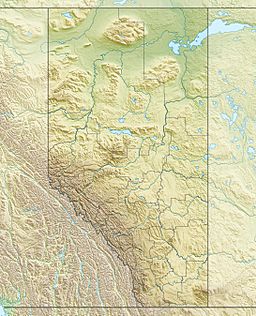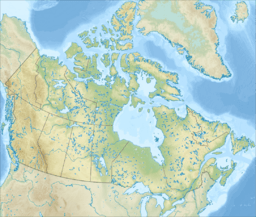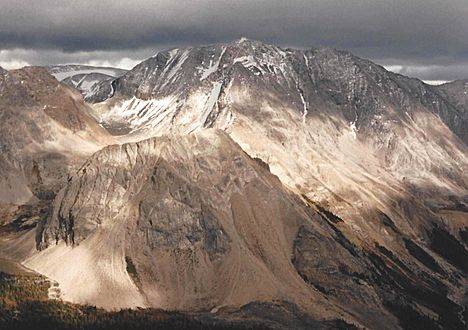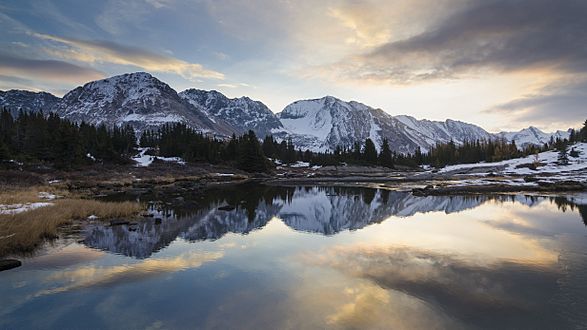Lychnis Mountain facts for kids
Quick facts for kids Lychnis Mountain |
|
|---|---|
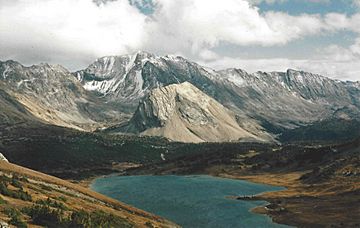
Lychnis Mountain centered in the distance behind Tilted Mountain and Baker Lake
|
|
| Highest point | |
| Elevation | 3,124 m (10,249 ft) |
| Prominence | 244 m (801 ft) |
| Parent peak | Mount St. Bride (3394 m) |
| Listing | Mountains of Alberta |
| Geography | |
| Location | Alberta, Canada |
| Parent range | Sawback Range Canadian Rockies |
| Topo map | NTS 82O/5 |
| Geology | |
| Age of rock | Cambrian |
| Type of rock | Sedimentary rock |
| Climbing | |
| First ascent | 1969 A.J. Kauffmann, W.L. Putnam, L. Putnam, L.R. Wallace |
Lychnis Mountain is a tall mountain located in Banff National Park, Alberta, Canada. It stands about 3,124 meters (10,249 feet) high. This impressive peak is part of the Sawback Range within the beautiful Canadian Rockies.
The closest taller mountain to Lychnis Mountain is Mount St. Bride, which is about 3.1 kilometers (1.9 miles) to the north. Lychnis Mountain is also situated near Tilted Mountain. The rocks around Lychnis Mountain are special because they are part of the Skoki Formation limestone. This area is famous for its many fossils, including ancient sea creatures like brachiopods, gastropods, and trilobites!
Contents
The Story Behind Lychnis Mountain's Name
Lychnis Mountain got its name in 1911. It was named by James F. Porter after a type of pretty alpine flower called Lychnis. These flowers often grow in mountain areas.
The mountain's name was officially recognized in 1956. This happened when the Geographical Names Board of Canada approved it.
First People to Climb Lychnis Mountain
The very first time someone successfully climbed to the top of Lychnis Mountain was in 1969. This amazing feat was achieved by a team of climbers: A.J. Kauffmann, W.L. Putnam, L. Putnam, and L.R. Wallace.
How Lychnis Mountain Was Formed
Just like other mountains in Banff National Park, Lychnis Mountain is made up of sedimentary rock. This type of rock forms from layers of sand, mud, and tiny bits of ancient sea creatures that settle at the bottom of oceans over millions of years.
These rocks were laid down during periods from the Precambrian to the Jurassic eras. Long ago, these areas were covered by shallow seas. Later, during a huge event called the Laramide orogeny, these rock layers were pushed up and folded. This powerful process created the towering mountains we see today in the Rockies.
Mountain Weather and Climate
Lychnis Mountain is located in a subarctic climate zone. This means it has very cold and snowy winters. The summers are usually mild.
During winter, temperatures can drop below −20 °C (−4 °F). With the wind chill, it can feel even colder, sometimes below −30 °C (−22 °F)! It's a chilly place, but also very beautiful.
Gallery


